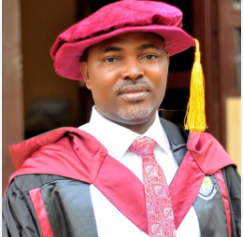By David Dari
LAFIA – Nasarawa State University Don, Dr. Vincent Paul, has called on the federal government to establish skills acquisition and entrepreneurship centers in all 774 Local Government Areas as a critical measure to reduce youth involvement in crime.
Dr. Paul appealed while delivering a paper at a workshop focused on “Youth Involvement in Crime and Criminality” held in Keffi, Nasarawa State.
According to him, in recent years, incidents of armed robbery, violent attacks, and kidnappings, particularly those affecting lecturers and students from Nasarawa State University, Keffi, have escalated. Concerned about the persistent insecurity, key stakeholders—including academics, traditional rulers, and security heads—gathered in Keffi to discuss solutions to safeguard schools across the state.
Dr Paul, from the Department of Entrepreneurship Studies at Nasarawa State University, highlighted that “low levels of education, idleness, and a loss of societal values are major drivers of crime among youths.” He called for a “paradigm shift toward policies that restore the value system in society and emphasize dignity in labor.”
The lecturer stressed that the foundation for entrepreneurship and self-reliance begins at home. “Parents, community leaders, and traditional institutions must play a greater role in preparing children to be self-reliant through skills acquisition,” Dr. Paul stated.
In addition, Mrs. Sarah Irukera, the Deputy Commandant of the Nigeria Security and Civil Defense Corps, explained that the state command, under the Save Schools Initiative, has ramped up surveillance and intelligence gathering across schools to tackle any threats to student safety.
“The security of our schools is a top priority. We’ve intensified efforts to ensure that no student is left vulnerable to criminal activities,” Mrs. Irukera said.
Associate Professor Hauwa Mainoma, Patron of the Friends of Police and organizer of the workshop, underscored the crucial role of traditional institutions in community security. “Every perpetrator of crime comes from a home,” she noted, emphasizing that securing communities starts with families and local leaders.
At the close of the workshop, participants resolved to strengthen engagement with youths in their communities, aiming to reduce crime through continuous dialogue and proactive measures.






